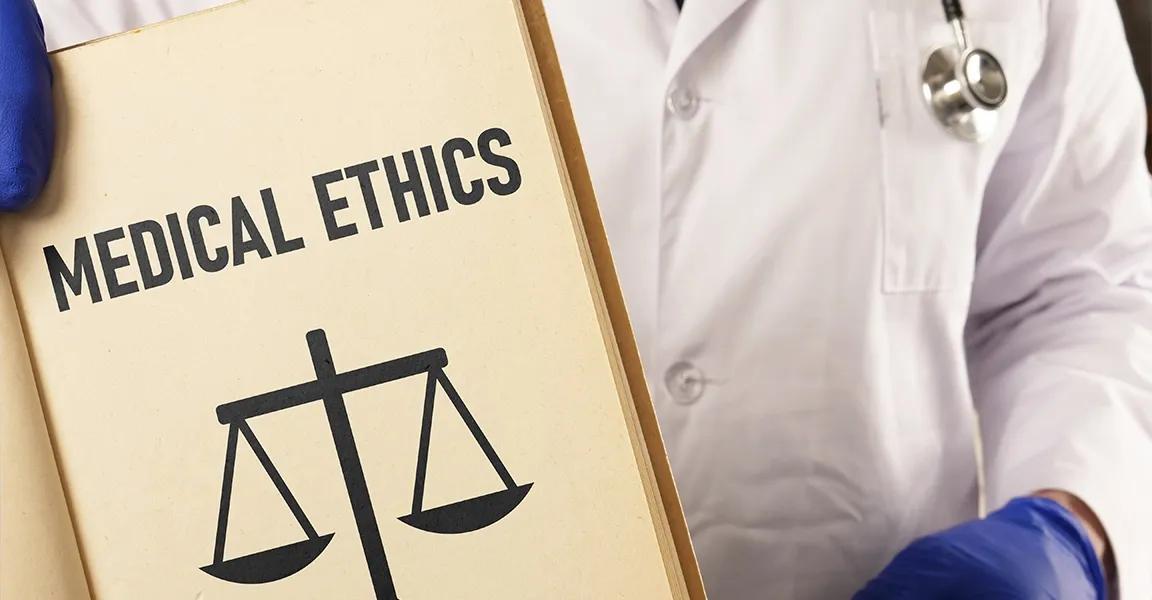
The concept of medical ethics is a guiding star in all aspects of healthcare. It lights the way for professionals as they navigate the complexities of medical practice.
Medical ethics encompasses a broad spectrum of moral principles and values that govern the conduct of those in the healthcare profession. Understanding and adhering to ethical standards in contemporary healthcare cannot be overstated. As we delve into new technologies, diverse patient populations, and complex healthcare systems, the role of ethics in healthcare takes center stage in providing compassionate, effective, and equitable care.
Understanding Medical Ethics
Medical ethics is a foundational element of healthcare. It guides professionals through complex moral decisions they encounter in practice.
The Definition and Scope of Medical Ethics
Medical ethics is a multidimensional field deeply embedded in the fabric of healthcare. It involves making informed decisions that respect the autonomy and dignity of patients. It also considers societal, legal, and cultural implications. The scope of medical ethics is vast covering issues from patient care and confidentiality to research ethics and resource allocation. It is a moral compass guiding healthcare professionals in their everyday decisions and interactions.
The Historical Evolution of Medical Ethics
The roots of medical ethics can be traced back to ancient civilizations. The establishment of the Hippocratic Oath laid the foundational principles that are still relevant today. Over centuries, these principles have evolved, influenced by changing societal norms, medical advancements, and philosophical thought. Notably, significant events in the 20th century like the Nuremberg Trials and the Tuskegee Syphilis Study brought about a heightened awareness of ethical issues in healthcare. This led to stricter regulations and ethical standards in medical practice and research.
Key Principles of Medical Ethics
Central to understanding medical ethics are its fundamental principles that act as the pillars of ethical decision-making in healthcare:
- Autonomy: Acknowledging the decision-making capacities of autonomous individuals and facilitating their ability to make well-informed, reasoned choices.
- Beneficence: The duty to ‘do good’ and actively contribute to the welfare of patients.
- Non-maleficence: A commitment to avoiding harm to the patient.
- Justice: The obligation to treat all individuals equally and fairly while allocating healthcare resources justly.
- Confidentiality: Upholding the privacy of patient information.
These principles are actively practiced and reflected in every aspect of patient care. They form the backbone of the healthcare professional’s moral obligations, from the primary care clinic to the operating room. They ensure medical law and ethics are upheld and patient trust is always maintained.
Ethical Issues in Healthcare Today
Healthcare professionals today are confronted with a range of complex ethical issues.
Patient Confidentiality and Privacy
One of the paramount concerns in medical ethics is safeguarding patient confidentiality and privacy. Healthcare providers must protect sensitive patient data, especially when information is easily accessible and shareable. Ethical issues in healthcare concerning confidentiality involve respecting the privacy of patient information and navigating the complex landscape of regulations and laws designed to protect this information. Violations breach trust and can have serious legal repercussions.
Informed Consent and Patient Autonomy
Informed consent is a fundamental principle in medical ethics. It ensures patient autonomy and respect for their decision-making rights. It involves providing patients with comprehensive information about their medical condition, treatment options, and potential risks. This enables patients to make informed decisions about their care. It’s about respecting the patient’s autonomy and acknowledging their right to control what happens to their bodies and to make informed choices about their treatment.
End-of-Life Decisions
End-of-life care presents profound ethical issues in healthcare. Decisions around life-sustaining treatments, palliative care, and euthanasia involve navigating a complex emotional, ethical, and legal terrain. Healthcare providers must balance medical ethics with compassion, respect for patient wishes, and the realities of medical prognoses. These scenarios demand a deep understanding of medical law and ethics as they often involve delicate conversations with patients and their families about death and dying.
Allocation of Scarce Medical Resources
The allocation of limited medical resources is a significant ethical challenge in healthcare. Decisions about who receives care, particularly in emergencies or with limited resources (like organ transplants), are complex. Medical ethics require a fair and equitable approach, but the reality of these decisions often involves complex judgments about patient eligibility and priority. This aspect of ethics in healthcare demands a balance between fairness, medical needs, and the efficient use of resources.
Addressing Medical Errors
Medical errors are an unfortunate reality in healthcare. Ethical issues in healthcare arise in acknowledging, reporting, and addressing these errors. Medical ethics dictates the need for transparency and accountability in such situations. Healthcare professionals are ethically obligated to disclose errors to affected patients and take steps to rectify them, a principle that is closely tied to maintaining trust and integrity in the patient-provider relationship.
Ethics in Healthcare Decision-Making
Ethics in healthcare decision-making involves complex judgments where healthcare professionals must sometimes weigh conflicting ethical principles.
Role of Ethics Committees in Hospitals
Ethics committees are crucial to guiding decision-making in complex situations in hospitals. Often composed of healthcare professionals, ethicists, and sometimes patient representatives, these committees provide a platform for discussing and resolving complex ethical issues in healthcare. They help interpret medical law and ethics in specific situations, offering recommendations that balance patient rights, medical necessity, and ethical principles.
Navigating Ethical Dilemmas
Healthcare professionals frequently encounter ethical dilemmas where the right course of action may not be clear-cut. Navigating these dilemmas involves applying the principles of medical ethics to specific situations. This process often requires balancing conflicting values and considering the implications of different actions on patient care, legal obligations, and ethical standards.
Medical Law and Ethics
The interplay between medical law and ethics is a critical area of focus in healthcare. It underscores the legal and ethical obligations of healthcare professionals.
The Intersection of Law and Medical Ethics
The relationship between medical law and ethics is a pivotal aspect of healthcare. While medical ethics guides healthcare professionals on what is morally right, medical law dictates what is legally acceptable. This intersection creates a framework within which healthcare providers must operate by balancing ethical considerations with legal requirements. Understanding this relationship is essential for navigating the complex scenarios that arise in ethics in healthcare.
Legal Responsibilities of Healthcare Professionals
Healthcare professionals are bound by specific legal responsibilities that align with medical ethics. These responsibilities include adhering to standards of care, maintaining patient confidentiality, and obtaining informed consent. Failure to meet these legal obligations can result in legal actions against healthcare providers. A thorough understanding of medical law and ethics is crucial for professionals to avoid legal pitfalls and uphold the highest ethical standards.
Understanding Malpractice and Negligence
Medical malpractice and negligence are among the most significant legal issues in healthcare. Malpractice occurs when a healthcare provider deviates from the standard of care or harms a patient. This is closely tied to medical ethics as ethical practice involves providing care that meets professional standards. Understanding the nuances of malpractice and negligence is vital for healthcare professionals to ensure they deliver ethically and legally sound care.
Laws Governing Patient Rights and Safety
Several laws and regulations are designed to protect patient rights and safety. These include laws on patient privacy, such as the Health Insurance Portability and Accountability Act (HIPAA) in the United States, and regulations governing patient care and hospital operations. These laws transform healthcare ethical issues from moral guidelines into legal requirements. They reinforce the importance of ethical conduct in healthcare.
Cultivating Ethical Practice
Cultivating ethical healthcare practices is essential for ensuring high standards of patient care and professional integrity.
Strategies to Enhance Ethical Awareness in Healthcare Settings
Promoting an environment where medical ethics are a central focus requires strategic efforts. This includes creating policies that emphasize ethical practices and providing forums for discussing ethical issues in healthcare. It also involves encouraging transparency and accountability. Regular ethical audits and reviews can also be an effective strategy to ensure consistent ethical practice.
Education and Training in Medical Ethics
Continuous education and training in medical ethics are vital for healthcare professionals. This can be achieved through workshops, seminars, and continuous education courses. Educating healthcare providers about the latest developments in medical law and ethics ensures they can handle the ethical dilemmas they may face in their practice.
The Role of Leadership in Fostering Ethical Healthcare Environments
Leadership plays a critical role in shaping the ethics in healthcare. Healthcare leaders must demonstrate a commitment to ethical practices and create a culture where ethics in healthcare are valued and prioritized. Leading by example, encouraging open dialogue, and fostering an environment of mutual respect and integrity – these are some of the ways healthcare leaders can influence the ethical standards of their organizations.
Global Perspectives on Medical Ethics
The field of medical ethics is not confined to national boundaries. It has a global dimension that reflects diverse cultural, social, and legal perspectives. Understanding these varying perspectives is crucial for healthcare professionals working internationally.
Comparative Analysis of Medical Ethics in Different Cultures
Medical ethics can vary significantly across cultures. This variation reflects differing values, beliefs, and practices. For example, the concept of patient autonomy, highly emphasized in Western cultures, may be approached differently in societies where family-centric decision-making is prevalent. A comparative analysis of medical ethics in different cultural contexts helps healthcare professionals appreciate these variations and apply ethical principles sensitively and appropriately to diverse patient populations.
Ethics in International Medical Research
Ethical issues in healthcare are particularly relevant to international medical research. Researchers must navigate ethical considerations like informed consent, risk minimization, and equitable selection of participants across different countries with distinct ethical standards. This calls for a global approach to medical ethics to ensure research is conducted responsibly. It involves respecting both local and international ethical guidelines.
Global Health and Ethical Responsibilities
In global health, ethical responsibilities encompass addressing healthcare access and quality disparities. Healthcare professionals and organizations must consider how their actions affect health equity and the well-being of populations worldwide. This includes ethical considerations to resource allocation, responses to global health crises, and the development of international health policies.
Future Trends and Challenges
Healthcare is continuously evolving, and the domain of medical ethics frequently faces new and complex challenges. Emerging technologies and changing societal dynamics are constantly shaping the future of healthcare ethics.
Emerging Ethical Challenges with Technological Advancements
Technologies like artificial intelligence (AI) and telemedicine are transforming healthcare delivery across the globe. While they offer immense benefits, they also bring unique ethical issues in healthcare, such as data privacy concerns, the potential for bias in AI algorithms, and the implications of virtual patient-physician interactions. Navigating these challenges requires re-evaluating and adapting traditional medical ethics principles to the digital era.
Ethical Considerations in Personalized Medicine
Personalized medicine, tailored to individual patient characteristics, promises more effective treatments. It also raises ethical issues in healthcare, such as genetic privacy, access to personalized therapies, and the implications of genetic testing. These considerations require a nuanced understanding of medical law and ethics to balance innovation with ethical patient care.
The Role of Ethics in Public Health Crises
Public health crises like pandemics put medical ethics to the test. Decisions around quarantine, vaccination, and resource allocation during crises involve complex ethical considerations. Healthcare professionals must balance individual rights with public good, often under immense pressure and uncertainty. It underscores the importance of robust ethical frameworks in guiding responses to public health emergencies.
Upholding the Essence of Healthcare Through Medical Ethics
This article’s exploration of medical ethics underscores its fundamental role in healthcare. Ethical issues in healthcare are deeply embedded in the day-to-day decisions and interactions of healthcare professionals. Medical ethics guide healthcare providers in delivering compassionate, fair, and effective care, while medical law and ethics provide a legal framework that safeguards patient rights and upholds professional standards. As healthcare continues to evolve, driven by technological advancements and global interconnectedness, the need for an unwavering commitment to these ethical principles becomes increasingly paramount.
Continuous learning and adherence to ethics in healthcare are of paramount importance. Healthcare professionals must stay abreast of the latest developments in medical ethics and legal considerations to navigate the complexities of modern healthcare delivery effectively. Embracing these ethical standards is a moral imperative that ensures trust, integrity, and excellence in healthcare.
Propel Your Career with MyCareers
Staying ahead in your career requires continuous learning and professional development, especially in healthcare. This is where MyCareers steps in to offer an unparalleled healthcare career advancement platform.
Joining MyCareers means becoming part of a community that genuinely invests in your career growth. Network with peers and industry leaders, engage in insightful discussions, and share experiences that enrich your professional journey. With MyCareers, you can browse multiple resources, including videos and articles from industry experts.
Enjoy comprehensive support from career resources to networking events designed to power your professional journey. Discover job opportunities with leading healthcare providers and get matched to roles that will elevate your career to new heights. Your passion for healthcare and our resources and community can set you on the path to a rewarding and successful career.
Embark on this journey with MyCareers and unlock your potential in a career that’s not just a job but a calling.



